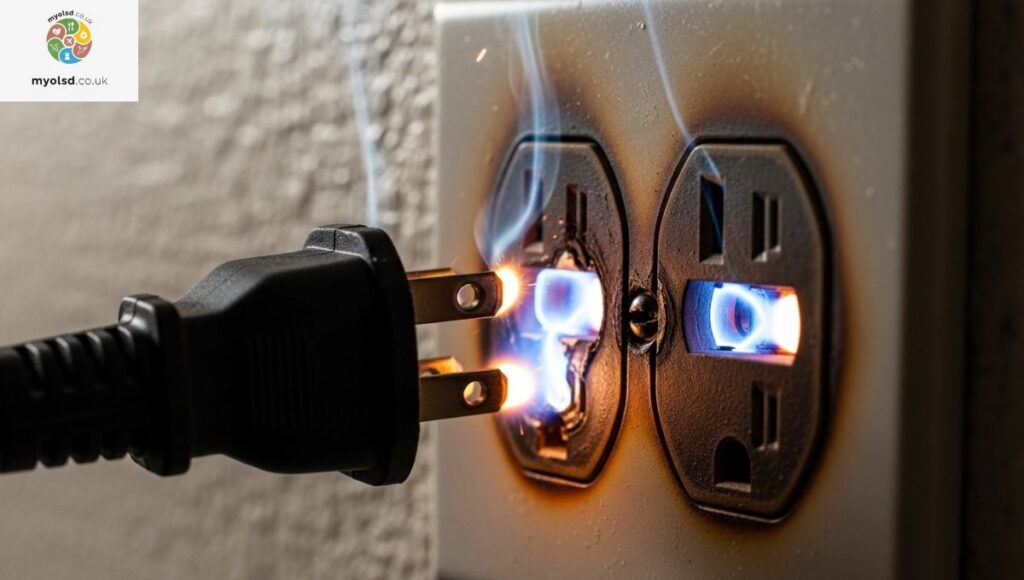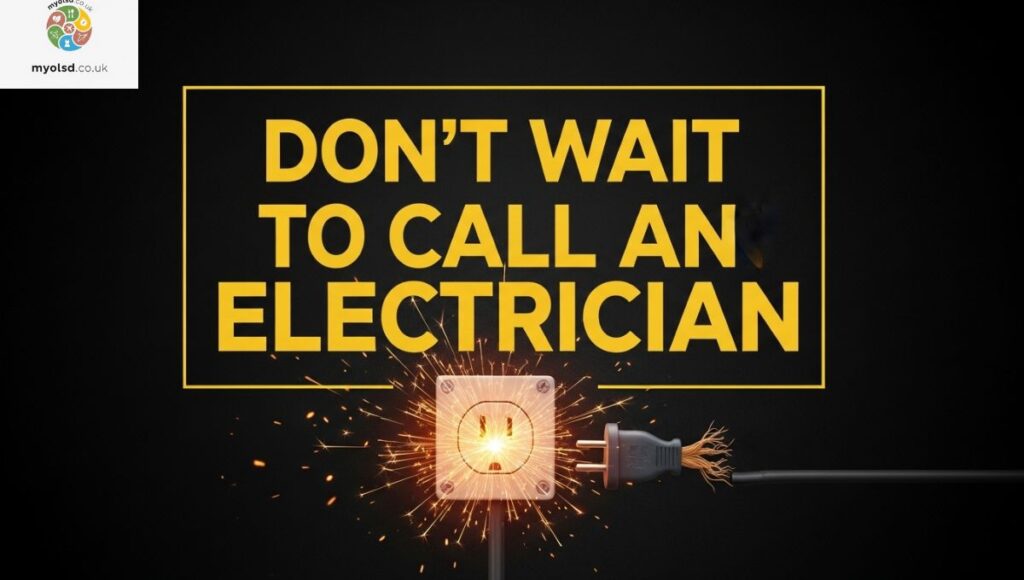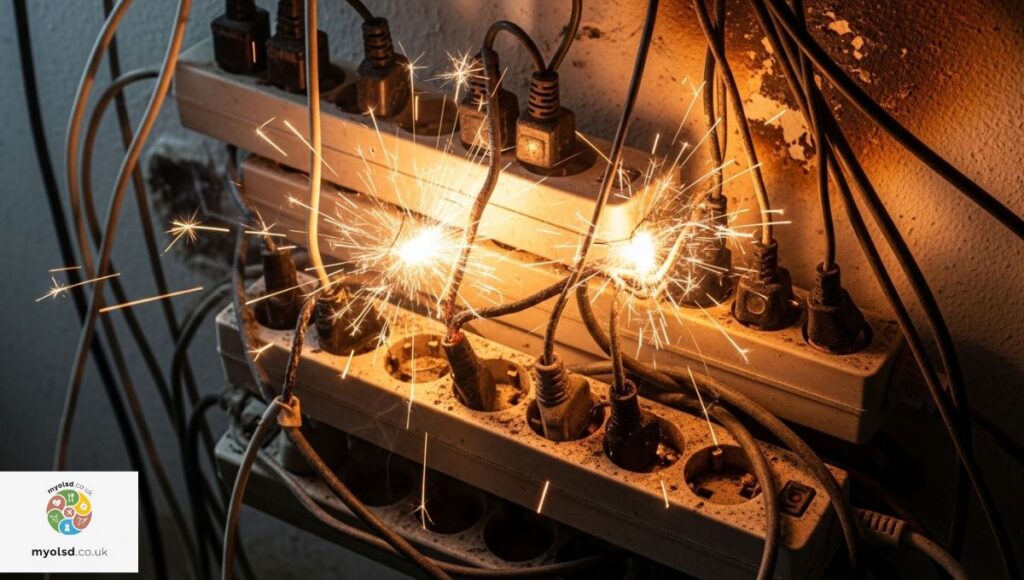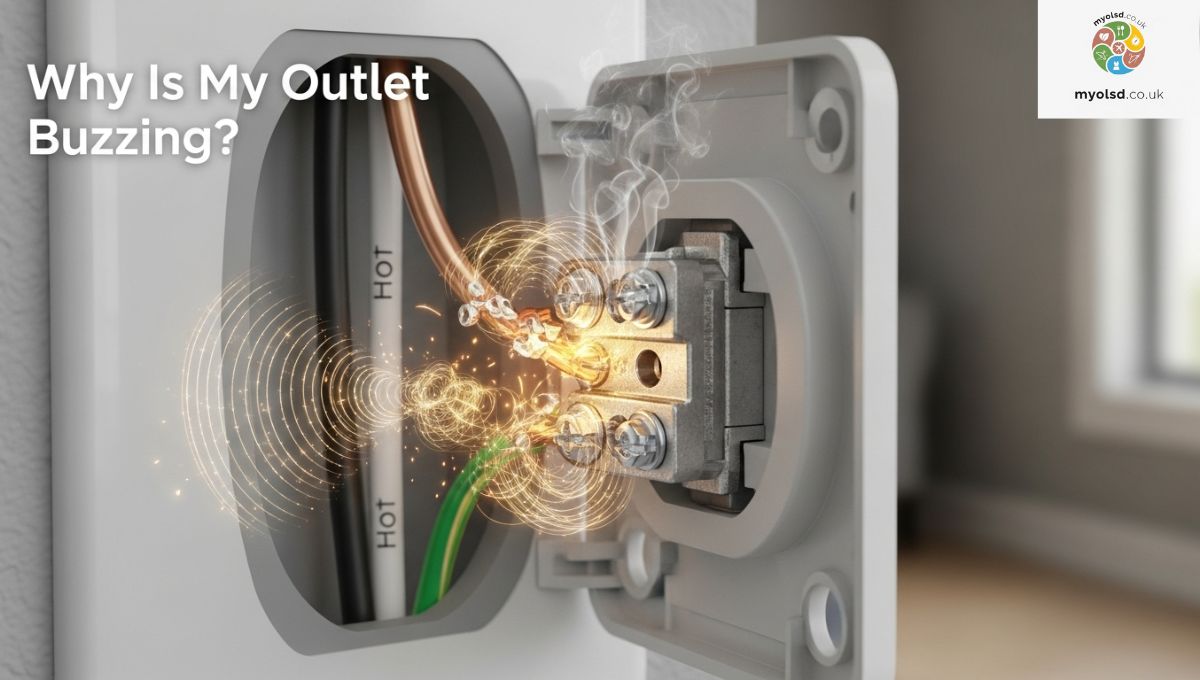Have you ever plugged something into an outlet and suddenly heard a strange buzzing sound? It’s one of those moments where you freeze and wonder if something’s about to spark or break. If you’re thinking, Why is my outlet buzzing? You’re not alone; many homeowners experience the same confusing and nerve-wracking noise. It’s frustrating because you’re unsure if it’s harmless or a sign of something more serious.
In this post, we’ll break down exactly what might be causing that buzzing sound in your outlet and what you can do about it. You’ll learn the most common reasons outlets buzz, the warning signs you shouldn’t ignore, and when it’s time to call a professional. By the end, you’ll feel more confident knowing how to handle the problem safely and prevent it from turning into something bigger.
What Does a Buzzing Electrical Outlet Mean?

A buzzing or humming noise from an outlet is a red flag. Outlets are designed to run silently, so any sound often points to loose wiring, an electrical imbalance, or a faulty connection. Older homes, especially those over 30 years old with outdated wiring, are more prone to these problems.
This sound happens because your home’s power runs on alternating current, which changes polarity many times per second. When that current is interrupted or unstable, you may hear a low hum, faint buzz, or even a snap-crackle-pop sound. Think of it like static on a radio; it’s the system’s way of telling you something’s wrong.
What Causes an Outlet to Make Noise?
Noise from an outlet almost always comes from something interfering with the electrical current. Loose wiring, overloaded circuits, or damaged components inside the outlet can all lead to vibrations and humming noises.
Sometimes the problem is as simple as improper installation or reverse polarity wires attached to the wrong terminals. Other times it’s more serious, such as corroded wires, melted insulation, or arcing inside the junction box. In any case, a buzzing outlet is more than just an annoyance; it’s a sign you should take action.
Are Buzzing Electrical Outlets Dangerous?
Yes, a buzzing electrical outlet can be dangerous. Not only can it damage your appliances or electronics, but it may also indicate an increased risk of electric shocks or fires. Common warning signs include flickering lights, blown fuses, warm or overheated outlets, and burn marks or melted plastic near the plug area.
If you’ve noticed any of these symptoms, switch off the power at the circuit breaker immediately and unplug all devices. These steps reduce the risk while you arrange for a professional inspection. Safety first, even a faint hum can signal a hidden hazard.
Read more Article:Why Real SEOs Use Rapid URL Indexe
Don’t Wait to Call an Electrician

Many homeowners try to ignore a faint buzzing noise, hoping it goes away. But electrical issues rarely fix themselves. Licensed electricians have the tools, like non-contact voltage testers, multimeters, and thermal imaging cameras, to pinpoint the cause of the noise safely.
Professionals can also identify hidden issues like overloaded circuits, grounding problems, or pests inside the outlet box. By addressing the root cause early, you’ll protect your home, family, and devices from potentially costly damage.
Causes of a Buzzing Electrical Outlet
Buzzing outlets don’t happen for one reason. In most homes, it’s a mix of small problems building up over time. Below are the most common causes you should know about before attempting any DIY fix.
This section gives you a roadmap of what to check first and when to step back and bring in an expert.
Loose Electrical Connections
Loose wiring is the number one cause of a buzzing outlet. Over time, screws loosen, wire terminals corrode, or vibration from plugged-in devices weakens the connection. This poor contact leads to resistance and heat, which creates the humming sound.
A quick visual inspection can sometimes reveal loose connections, but don’t try tightening anything without shutting off the breaker first.
Faulty or Outdated Wiring
Homes built decades ago often have wiring that’s no longer up to code. Aluminum wiring, for example, expands and contracts with temperature changes, which can loosen connections and cause buzzing. Outdated wiring also can’t handle modern high-draw appliances, increasing the risk of overload.
If you suspect your home falls into this category, schedule an inspection with a licensed electrician.
Overloaded Circuits

When too many devices are plugged into one circuit, it can’t deliver power evenly. This imbalance causes noise, overheating, and frequent breaker trips.
Consider redistributing your appliances across different outlets or installing dedicated circuits for high-demand devices like space heaters or microwaves.
Electrical Interference
Sometimes the buzz isn’t a wiring fault but interference from nearby electronic equipment. Dimmer switches, LED lights, and fluorescent bulbs can all produce a low hum or cause an outlet to vibrate audibly.
Adding line filters, ferrite beads, or upgrading dimmer switches can reduce this kind of interference.
Pests or Debris in the Outlet Box
It’s not pleasant to think about, but insects or small critters sometimes nest in warm outlet boxes. Their presence can interfere with wiring, cause arcing, or trap moisture that leads to corrosion.
If you suspect this, cut power, remove the faceplate, and carefully check. When in doubt, call a professional to handle it safely.
Identifying the Cause of the Buzzing
The first step to fixing a buzzing outlet is knowing exactly what’s causing it. This section explains how to troubleshoot safely.
Visual Inspection
Turn off power at the circuit breaker. Remove the outlet cover and look for burn marks, melted insulation, loose wire terminals, or signs of pests. A flashlight and non-contact voltage tester can help you inspect safely.
Circuit Testing
If the visual check looks fine, use a multimeter to test voltage or continuity. Look for unexpected voltage drops or reversed polarity. Professionals also use thermal imaging to detect hidden hot spots inside walls.
Calling in a Pro
If you’re unsure or the problem persists, call a licensed and insured electrician. They can diagnose complex issues, from breaker panel faults to grounding problems. Don’t risk your safety with guesswork.
Addressing the Buzzing Issue

Once you know the cause, you can take steps to solve it.
Tightening Loose Connections
After cutting power, gently tighten screws at the wire terminals. If wires look frayed or corroded, replace them instead of just tightening.
Replacing Faulty Wiring
Old, damaged, or aluminum wiring may need full replacement. This is a job for a licensed electrician to ensure it’s done safely and meets current codes.
Redistributing Electrical Loads
Spread out your high-draw appliances across multiple outlets or install dedicated circuits. This helps balance the electrical load and eliminates buzzing caused by overload.
Eliminating Electrical Interference
Upgrade dimmer switches, use shielded cables, or add ferrite beads to reduce electromagnetic noise. A qualified technician can recommend the best options for your situation.
Removing Pests or Debris
Shut off power, remove the cover plate, and gently clear debris. If you suspect critters, seal entry points and call pest control.
Safety Precautions

Electricity is nothing to take lightly. Always follow these safety tips when dealing with outlets.
Put Safety First
If you hear a buzzing outlet, treat it as an urgent issue. Switch off the power immediately and unplug all devices.
Cut the Power
Always turn off the circuit breaker before inspecting or touching any wiring.
Wear Protection
Use rubber-soled shoes and non-conductive gloves when working near outlets.
Have a Spotter
If you’re unsure, have someone nearby while you work. Better yet, hire a pro.
Avoid Moisture
Never work on electrical outlets in wet conditions.
Respect Experience Levels
DIY electrical work has limits. Know when to call in a trained, licensed electrician.
Silence That Buzz with Precision Today’s Outlet Experts

A buzzing outlet isn’t just an annoying sound; it’s a warning sign. By understanding the causes, taking safety precautions, and calling a professional when needed, you’ll protect your home and loved ones from serious hazards.
Whether it’s loose wiring, overloaded circuits, or something more complex, don’t ignore it. Take action today and enjoy peace of mind knowing your home’s electrical system is safe and sound.
FAQs
How do you fix a buzzing outlet?
Turn off the power at the circuit breaker, inspect the wiring, and tighten loose connections. If the noise continues, call a licensed electrician to diagnose and repair the problem safely.
Is it safe to use a buzzing outlet?
No. A buzzing outlet is a warning sign of a wiring or load issue. Stop using it immediately and get it checked by a professional.
Should I unplug a buzzing outlet?
Yes. Unplug all devices and switch off the circuit breaker right away to reduce the risk of shock or fire until an electrician can inspect it.
Can a buzzing outlet cause a fire outside?
Yes, faulty or arcing wiring inside an outlet can overheat and potentially start a fire that spreads to surrounding materials even outside walls.
How do you get rid of electrical buzzing?
Identify the source first. This might mean redistributing loads, tightening wiring, or replacing faulty components. When in doubt, call an electrician.
Is electrical buzzing bad?
Yes. Electrical buzzing indicates an underlying issue like loose wiring, overload, or interference that should never be ignored.
What does faulty wiring sound like?
Faulty wiring may sound like a low hum, faint buzz, or occasional crackling and popping near outlets or switches.
How to stop power supply buzzing?
Move high-draw devices to separate circuits, upgrade dimmers or wiring, or install noise filters. If buzzing persists, a professional should inspect your electrical system.


1 thought on “Why Is My Outlet Buzzing? Common Causes & Quick Fixes”